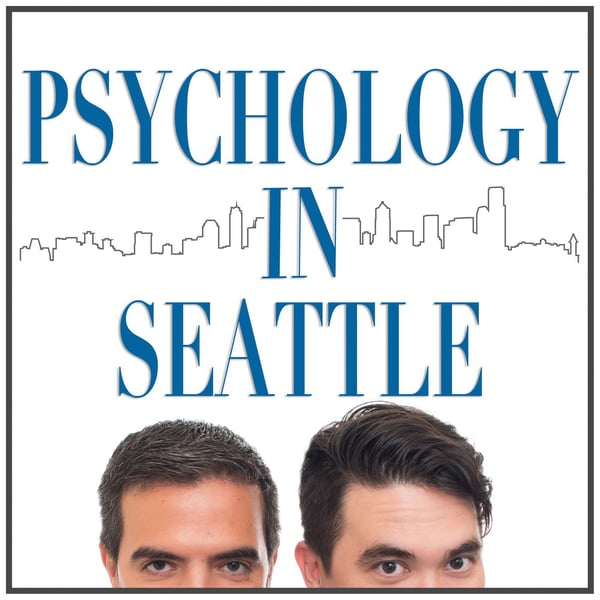My Mentor Died
Psychology In Seattle Podcast
Kirk Honda
4.6 • 1.2K Ratings
🗓️ 20 November 2024
⏱️ 198 minutes
🧾️ Download transcript
Summary
This episode is sponsored by BetterHelp. Give online therapy a try at betterhelp.com/KIRK to get 10% off your first month.
Become a member: https://www.youtube.com/channel/UCOUZWV1DRtHtpP2H48S7iiw/join
Become a patron: https://www.patreon.com/PsychologyInSeattle
Email: https://www.psychologyinseattle.com/contact
Website: https://www.psychologyinseattle.com
Merch: https://teespring.com/stores/psychology-in-seattle
Instagram: https://www.instagram.com/psychologyinseattle/
Facebook Official Page: https://www.facebook.com/PsychologyInSeattle/
TikTok: https://www.tiktok.com/@kirk.honda
November 20, 2024
The Psychology In Seattle Podcast ®
Trigger Warning: This episode may include topics such as assault, trauma, and discrimination. If necessary, listeners are encouraged to refrain from listening and care for their safety and well-being.
Disclaimer: The content provided is for educational, informational, and entertainment purposes only. Nothing here constitutes personal or professional consultation, therapy, diagnosis, or creates a counselor-client relationship. Topics discussed may generate differing points of view. If you participate (by being a guest, submitting a question, or commenting) you must do so with the knowledge that we cannot control reactions or responses from others, which may not agree with you or feel unfair. Your participation on this site is at your own risk, accepting full responsibility for any liability or harm that may result. Anything you write here may be used for discussion or endorsement of the podcast. Opinions and views expressed by the host and guest hosts are personal views. Although, we take precautions and fact check, they should not be considered facts and the opinions may change. Opinions posted by participants (such as comments) are not those of the hosts. Readers should not rely on any information found here and should perform due diligence before taking any action. For a more extensive description of factors for you to consider, please see www.psychologyinseattle.com
Transcript
Click on a timestamp to play from that location
| 0:00.0 | Hey, deserving listeners. So my mentor, Paul David, died recently. And some of you might remember him coming on the podcast earlier this year talking about his Alzheimer's diagnosis and his decision to have physician-assisted suicide in Switzerland because it's not legal in the United States. |
| 0:24.0 | Well, he went through with that recently and he died. He's dead. He's dead. And before he died, |
| 0:35.7 | we had a living wake where everyone could get together before he died with him |
| 0:42.8 | there and have appreciations and get-togethers and hugs and a last goodbye for some people. |
| 0:52.7 | But he and his wife got a severe case of COVID, so they couldn't |
| 0:58.7 | attend. He was so sick, he couldn't even attend a Zoom call, right? But we recorded it, so he got |
| 1:08.0 | to watch the recording at least. But was a let down but like I said |
| 1:13.8 | I did talk with him on the phone periodically and it was good felt good to have those conversations |
| 1:21.7 | and to I don't know just talk about the old days and talk about his feelings, |
| 1:35.9 | how he felt about everything that he was going through. |
| 1:40.9 | He really, really did not want to put his family, his wife, in particular, through the torment of having a spouse with Alzheimer's as it progresses. |
| 1:55.0 | It could be very painful. |
| 1:56.9 | It could be very hard. |
| 1:58.6 | It can be very scary for everybody, including the person with Alzheimer's. |
| 2:03.0 | Not everyone, but for some people with Alzheimer's, it can result in personality changes, |
| 2:11.0 | depression, anxiety, paranoia, terror, aggression, and it can last for a long time. |
| 2:20.1 | And the way that he saw it past a certain point of degradation, it's not really him anymore, you know? |
| 2:30.8 | And he didn't want to go through it himself, but he particularly didn't want to put his family |
| 2:37.6 | through it. He had known what it was like because he had a mother and a grandmother, close people |
| 2:44.3 | in his life who had Alzheimer's and Louis body dementia, very similar to Alzheimer's, and he saw the effects, the |
| 2:52.5 | torment. |
| 2:54.3 | He also didn't want to drain the finances of the family. |
... |
Please login to see the full transcript.
Disclaimer: The podcast and artwork embedded on this page are from Kirk Honda, and are the property of its owner and not affiliated with or endorsed by Tapesearch.
Generated transcripts are the property of Kirk Honda and are distributed freely under the Fair Use doctrine. Transcripts generated by Tapesearch are not guaranteed to be accurate.
Copyright © Tapesearch 2025.

